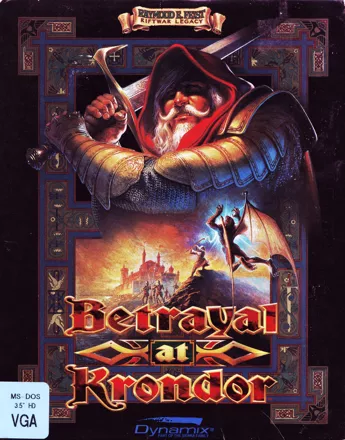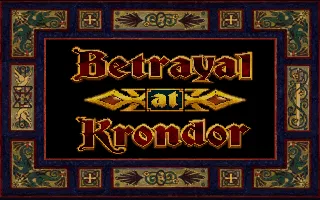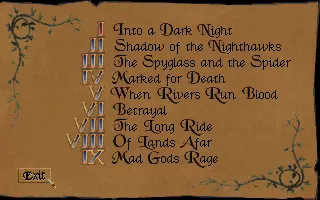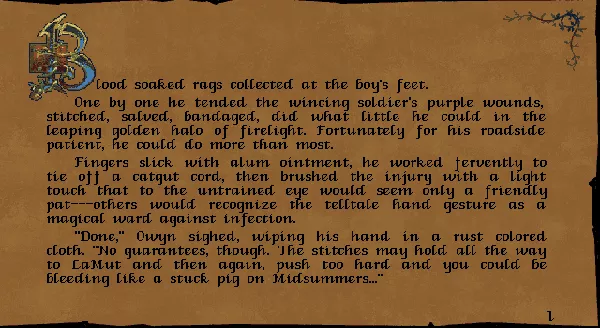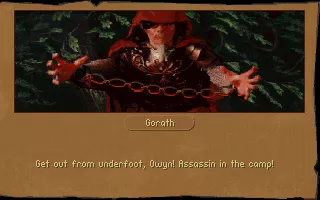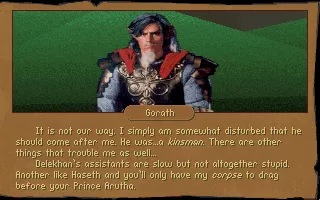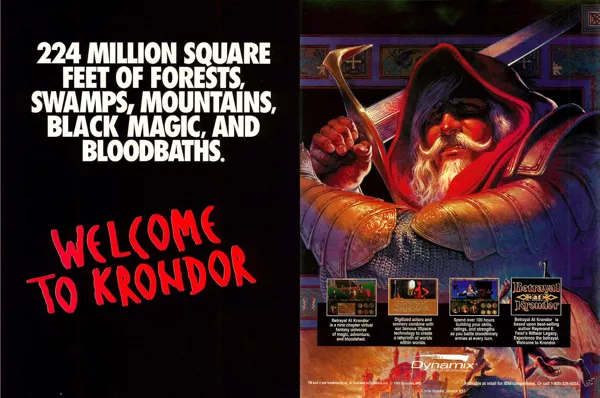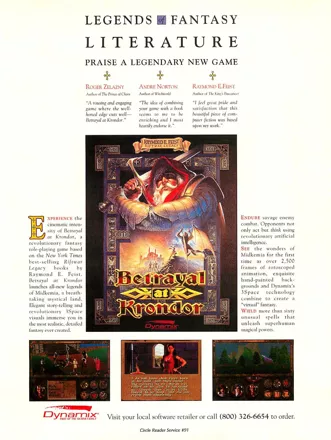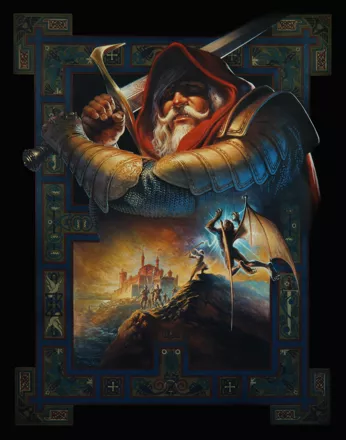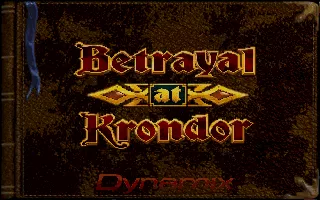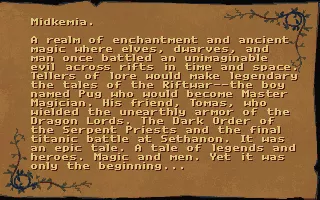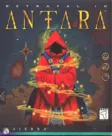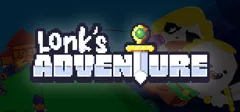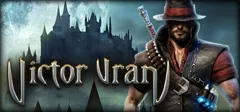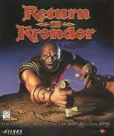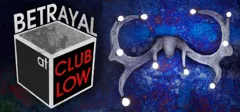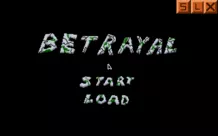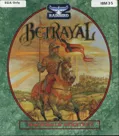Betrayal at Krondor
Description official descriptions
Based on Raymond E. Feist's Riftwar saga (and co-written by Feist himself), Betrayal at Krondor is a medieval fantasy-themed role-playing game set in the Riftwar universe.
The story begins as Gorath, a moredhel (dark elf) renegade, who intended to warn the people of Krondor of the upcoming moredhel invasion, is attacked by an assassin. Locklear, a nobleman who serves the crown of Krondor, and a young magician named Owyn decide to accompany Gorath to Krondor, where they'll have to think of a plan to stop the moredhel leader Delekhan.
The game's story is divided into nine chapters. Each chapter has a goal to achieve before moving on to the next one, but the player is given considerable freedom to explore the vast world of the game and undertake side quests. Gorath, Locklear, and Owyn are the first party of characters the player controls; however, characters may leave and others may join the party later, as dictated by the events of the story.
Exploration in Betrayal at Krondor takes place in a 3D world viewed from first-person perspective. Towns, however, are presented as a series of still screens representing locations (temple, tavern, inn, etc.). Combat takes place on separate grid-based screens. The player moves the characters on these screens in a turn-based fashion, attacking physically, defending, and casting spells.
Only two character classes are present in the game: fighters and magicians. Fighters use swords or crossbows (for long-ranged attacks); magicians can fight with staves, or cast spells. Characters have four attributes: health, strength, speed, and stamina. The latter is depleted when a character uses weapons or casts magic. The role-playing system of the game relies on skills. Each character has a set of skills, ranging from weapon proficiencies to abilities such as bartering or stealth. Skills improve after continuous usage. The player can "emphasize" a skill in order to make it improve faster.
Spellings
- קרונדור - Hebrew spelling
- 叛變克朗多 - Chinese spelling (traditional)
Groups +
Screenshots
Promos
Videos
Add Trailer or Gameplay Video +1 point
See any errors or missing info for this game?
You can submit a correction, contribute trivia, add to a game group, add a related site or alternate title.
Credits (DOS version)
153 People (109 developers, 44 thanks) · View all
| Design | |
| Lead Programming | |
| Programming | |
| Graphics / 3D Programming | |
| Level / Scenario Design | |
| Graphics / Artwork | |
| Music | |
| Art Director | |
| Cover Art | |
| Documentation | |
| Director | |
| Writing / Dialogue / Story | |
| Playtesting | |
| [ full credits ] | |
Reviews
Critics
Average score: 84% (based on 16 ratings)
Players
Average score: 3.9 out of 5 (based on 102 ratings with 12 reviews)
For players who are not graphics-oriented. Try this out.
The Good
The spell system was out of its time, most other games of that time did not have these kind of features.
The game has a great number of spells, from the passive Despair Thy Eyes to the monstrous Mad God's Rage.
The Bad
A rather buggy game,I know of a number of bugs, but some of these bugs actually made the game more fun! =)
Graphical issue again...
The Bottom Line
It has some chills in this game
(6 years ago i was playing this game and i got a little scared of the ghostly parts, now l'm still rather afraid of walking at night...)
This game has a free, full download, it is released by the kind folks from Sierra, go download it and have fun! (by search engine)
DOS · by Kevlarkid (2) · 2001
The Good
Set in fantasy novelist Raymond Feist’s world of Midkemia, Betrayal at Krondor (BaK) received great acclaim from the press. The game attempts to blend together storytelling, puzzles, and roleplaying into a cohesive whole.
Sales of the game were slow upon its initial release, but then picked up when the game was released on the then-new CDROM format. The game’s use of digitized photos of “actors” for the characters’ faces was innovative (if a bit cheesy) and even influential, given that Might and Magic VI would use the same technique a few years later. The musical score is appropriately sweeping and adds to the whole RPG-meets-Renaissance Fair atmosphere.
The Bad
Unfortunately, the graphic novel aspect of the game conflicts with the role-playing element, and thus the whole thing never quite comes together in a satisfying way. You get to control characters in combat and equip them as you go along, but this has a considerable downside: there is no such thing as starting out with a character of your own creation, nor do you have any idea which characters you will be using in future chapters. You may work extremely hard to bulk up Gorath, only to find out that he isn’t going to be a part of the story for a while, so you should have been working on boosting Owyn’s stats and inventory instead.
This game takes a long time to complete (easily over 50 hours, perhaps 100 or more if you explore everywhere and complete all of the quests), but very little of the time spent seems to be taken up by actual gameplay. Traveling outdoors is very tedious, and only by shelling out a pretty sizable chunk of your hard-earned cash can you use the jumpgates (found in temples) to move around the game world more quickly. Supposedly you can move around to the various areas in any order you want, but in reality the designers have made sure that you cannot do so. This would let the individual get too far off course from the storyline, so you are either blocked off by contrived plot devices (“Milord, this road is not passable until the snows have melted!”) or killed immediately by overwhelmingly powerful foes.
Losing even one member of your party in combat invariably means death to all, since you will almost certainly need to escape, but escape is only allowed when all members of your party are conscious (the need to keep characters in the story means no one is expendable) AND the way is not “blocked” by opponents. I say “blocked” in quotes, since I have not noticed the enemy ever doing anything in particular to achieve this tactic. Perhaps it is calculated by the CPU but not represented onscreen.
It is to Feist’s credit that Midkemia is interesting enough that some will want to plow through BaK to the end. It’s really just a blend of Tolkien, Dungeons and Dragons, and a bunch of other fantasy and science fiction conventions, although I suppose it’s fairly cohesive and believable as these things go.
The Bottom Line
Betrayal at Krondor is a failure as a coherent game, since its adventure/story portions ruin the fun of the role-playing/combat portions, and vice versa. I can only attribute this game’s sales success to its clever use of the CDROM format, the dearth of other CRPG’s on the market at the time, and to the prestige of its nominal author Raymond Feist. Feist has wisely turned the core of the Krondor story into an old-fashioned paperback novel, Krondor: The Betrayal. Gamers and Feist fans alike are advised to pass the CDROM up and give the book a go instead.
DOS · by PCGamer77 (3158) · 2011
The Good
I love how easily you are immersed into the world of Midkemia and the lives of the characters. Gorath and Owyn are still my favourite characters from Feist's novels, years after I first played the game.
The Bad
The ending. Something bad happens to one of the characters I was very fond of.
There is a major bug - if you cast Final Rest on a dead Nighthawk/Black Slayer while another character or enemy is standing upon the same tile the dead enemy is on, the unlucky soul is sucked away with the dead Nighthawk and the game becomes frozen.
The Bottom Line
I loved the game. The storybook elements, puzzles and riddles, and the characters themselves make the game well worthwhile.
DOS · by Jaymie Rogers (1) · 2013
Discussion
| Subject | By | Date |
|---|---|---|
| A flood of nostalgia | St. Martyne (3648) | Mar 1, 2010 |
| CD and Floppy | Unicorn Lynx (181775) | Aug 10, 2009 |
| GameTap | SharkD (425) | Sep 10, 2008 |
| Translating BaK? | Ajan (262) | Jul 6, 2007 |
Trivia
Actors
The actors for the pseudo-video and motion capture don't look remotely like they're described by Raymond E. Feist, and some (such as Pug) are downright contradictory.
CD-ROM version
The CD-ROM enhanced version of the game includes additional goodies: * 5-minute interview with Feist * Windows-based hint system * Redbook audio soundtrack
Freeware release
Sierra has released the game for free as promotion for its two sequels. This offer only lasted for a limited time, though. The version which was obtainable through on the Sierra website was buggy and needed a patch to get it working correctly.
Novel
Raymond E. Feist, the author whose Riftwar books Betrayal at Krondor is based on, has actually written a book based on the game entitled Krondor: The Betrayal, the first part of a new series called The Riftwar Legacy. The book has the same basic plot as the game, but of course has been altered somewhat to fit the format as well as to be more consistent with Feist's Midkemia series as a whole.
Feist does display an interesting knowledge of the game, however. For example, the method by which the villain is ultimately defeated in the book is actually a valid tactic for winning the final battle.
Sales
When the Betrayal at Krondor first came out it did so miserably at sales that Sierra canceled all plans for a sequel. Later, Sierra rereleased the game on CD-Rom and the game suddenly became a huge hit. By that time, however, Raymond E. Feist already had a contract with a different publisher.
Awards
- Computer Gaming World
- June 1994 (Issue #119) – Role-Playing Game of the Year
- February 1996 (Issue #139) – Introduced into the Hall of Fame
- November 1996 (155h anniversary issue) - #43 in the “150 Best Games of All Time” list
- GameStar (Germany)
- Issue 12/1999 - #76 in the "100 Most Important PC Games of the Nineties" ranking
- PC Gamer
- November 1999 - #44 Best Game of All Time
Information also contributed by Alan Chan, Adam Baratz Kalirion, PCGamer77, William Shawn McDonie and WizardX
Analytics
Upgrade to MobyPro to view research rankings!
Related Sites +
-
Alt-Tab: Betrayal at Krondor
Site dedicated to the game, includes various reviews of the game and some downloads. -
Betrayal At Krondor Help Web
All Things BAK. Also has a link to Sierra where you can download the game for free. -
Betrayal at Krondor - FAQs & Guides
Various Guides and FAQs posted on GameFaqs.com -
Mike's Betrayal at Krondor pages
Great resource site for Betrayal at Krondor. -
Official product page of Windows version distributor GOG
Official product page for the Windows version of Betrayal at Krondor - distributed by GOG.com.
Identifiers +
Contribute
Are you familiar with this game? Help document and preserve this entry in video game history! If your contribution is approved, you will earn points and be credited as a contributor.
Contributors to this Entry
Game added by Trixter.
Windows added by Picard.
Additional contributors: Jeanne, Tony Austin, formercontrib, Crawly, Paulus18950, Patrick Bregger.
Game added September 21, 1999. Last modified January 20, 2024.
